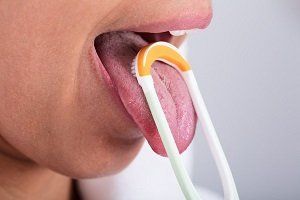5 Gross Consequences of Having a Dirty Tongue
- By Mary Marks
- •
- 26 Apr, 2021
- •

A dirty tongue is associated with poor oral hygiene.
Bacteria, fungi, food scraps and dead cells can get trapped between swollen
papillae and form a coating that covers the tongue. A good deep cleaning by a
Denver sedation dentist can do wonders
in combating the causes of bad breath.
Here are some causes of a dirty-looking tongue:
· incorrect brushing
· dry mouth
· incorrect use of dental floss
· breathing through the mouth
· dehydration
· eating soft foods
· irritation
· fever
· smoking or chewing tobacco
· alcohol consumption
There are also a few gross consequences of having a dirty tongue. These alone should definitely make you to grab your toothbrush and give your tongue a thorough scrubbing.
Halitosis
Also known as bad breath, it occurs when there is an overgrowth of bacteria in the mouth that emit an unpleasant odor.
Oral candidiasis
Also called “oral thrush”, or “yeast infection in the mouth”, this condition is caused by a fungus in the Candida species. The tongue has unaesthetic white-yellowish deposits and you will need treatment to get rid of this problem.
Black hairy tongue
This sounds terrible and it also looks gross. Food/ drink particles accumulate around the papillae causing keratin buildup, which gives the tongue a furry appearance.
Having a dirty tongue can also cause gum disease, or make you have less sharp taste buds.





Although oral sedation dentistry Highlands Ranch is one of the optionsavailable for managing anxiety and discomfort during oral surgery, you certainly do not need to use it all the time. As a matter of fact, the exact type of sedation or anesthesia that you receive during oral procedures may depend on various factors, such as the complexity of the procedure, your medical problems, as well as your doctor’s preferences.
There can be several different levels of sedation that can be used in oral surgery. Local anesthesia is one of them. This involves injecting anesthetic medication into the specific area where the surgery will take place. It numbs the area and is often used for less invasive procedures.
Oral sedation involves taking medication in the form of a pill to induce a state of relaxation and drowsiness. The patient is still conscious, but he/she may not be fully aware of the procedure. At any rate, sedation helps him/her get rid of anxiety.
In the case of intravenous sedation, medication is administered through a vein, which induces a deeper state of sedation than oral sedation. Patients may still be conscious, but they are less aware of their surroundings and may not remember the procedure.





